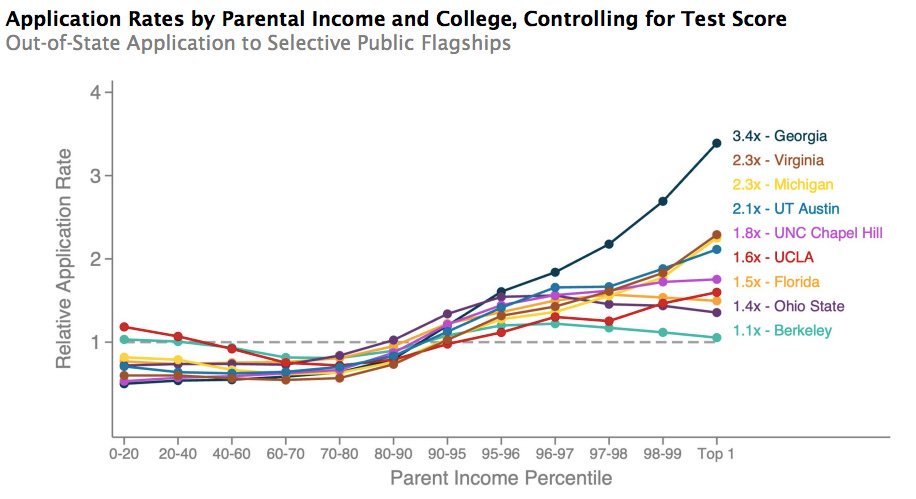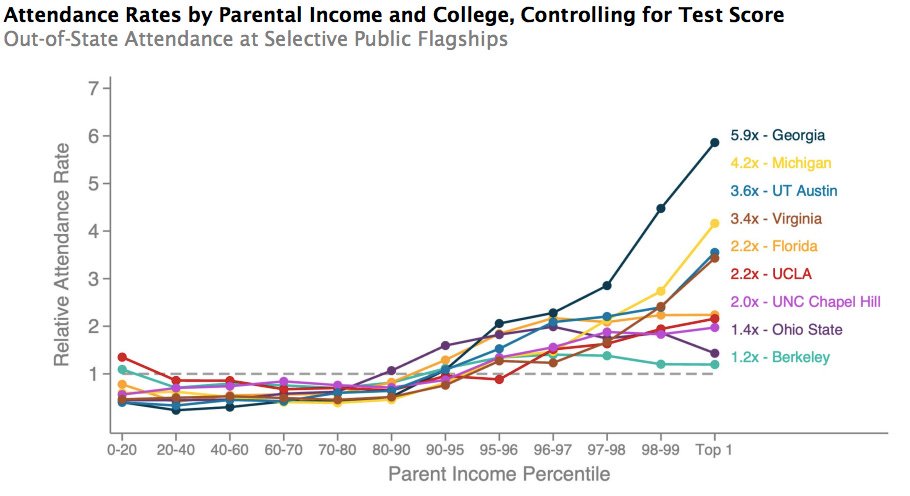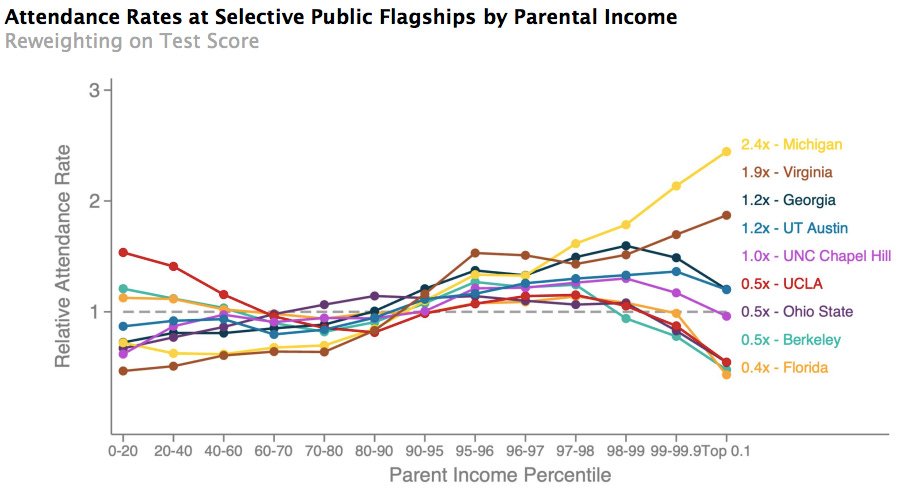State flagships do the right thing
Last week, we examined how income affects admission rates at the most elite colleges in the US. There are so many good insights in this paper by Raj Chetty, David Deming, and John Friedman. I want to pick each lesson up and turn it in the light a bit.
This week we’re examining how flagship state colleges (e.g. UC Berkeley, UMichigan) consider income in admission.
The answer is clear and reassuring: they don’t.
Kids with the same test scores get in an nearly identical rates across the whole income distribution. The study says:
“Conditional on SAT/ACT scores, admissions rates are virtually identical for students from low- and high-income families at all of the highly selective public colleges we study.”
I often feel unpleasantly cynical when I’m writing here, because that’s what the facts merit, but this is a happy story. State-school admission isn’t perfect either—especially the tendency to favor out-of-state kids who pay more tuition—but this particular behavior is what taxpayers and state legislators would want to see.
One other caveat is that Chetty and coauthors don’t show us the admission rate for each state school they study; they just show that orange line up there. Maybe one of the colleges they considered was less virtuous.
What does that mean for your kid?
Put some state schools on your list. My clients tend to lie in this income-admission valley, along with most Americans:
At the most elite schools in the country, your income means your kid faces tougher odds. At these public schools:
they won’t have that disadvantage. The gatekeepers are fairer. What about the competition?
Home and away
For in-state students, application rates for these prestigious public colleges don’t vary much by income.
This chart means a poor kid from Virginia is about as likely to apply to UVA as a rich or middle-class kid from Virginia.
The picture is very different for out-of-state applicants:
A kid from a family that earns more that $570k a year, the 99th percentile for income, is more than three times likelier than poorer kids to apply to UGA. But there is very little difference for UC Berkeley. The divergence among these schools for out-of-state applicants from the top few income percentiles is fascinating.
Sure enough, those differences in out-of-state application rates feed through into differences in out-of-state attendance rates at these colleges, even though the admission rates don’t change with income.
An out-of-state student at UGA is almost six times likelier to be from the top income percentile.
When we consider in- and out-of-state students all together, the differences in attendance by income are less marked, but there’s still a wide fan between Michigan and Florida.
If your kid wants to be around a lot of rich classmates—a prudent thing to do if she ever wants to get a startup funded—U Michigan and UVA are good options.
Georgia on my mind
Of the three charts about out-of-state applicants above, the application one is most interesting to me. It reveals something about the preferences of the very rich.
Very high earners are not too interested in UC Berkeley or UCLA, maybe because they figure those campuses have redistributive itches that would be uncomfortable for their children.
Ohio State and Florida probably don’t have the prestige to tempt parents who pull down almost $600k a year (sorry, alumni of those colleges!). The numbers for UNC, UT Austin, Michigan, and UVA are about what I would expect.
But what is the deal with UGA? Are there any readers, especially Southerners, who could explain the allure of UGA to the very rich? I live in Virginia, but just barely.
Takeaways
If your household earn between between $55k and $570k, and your child wants to attend a selective school, I recommend he or she consider applying to some of the colleges Chetty et al. describe as state flagships. They’re still very selective and prestigious places, and some of them will offer chances to meet rich classmates.
What else should your child consider when choosing colleges to apply to? Find out in my online class on making “the list.” You can also book a one-on-one session, and we’ll make a reasonable, humane plan together. I look forward to working with your family!








